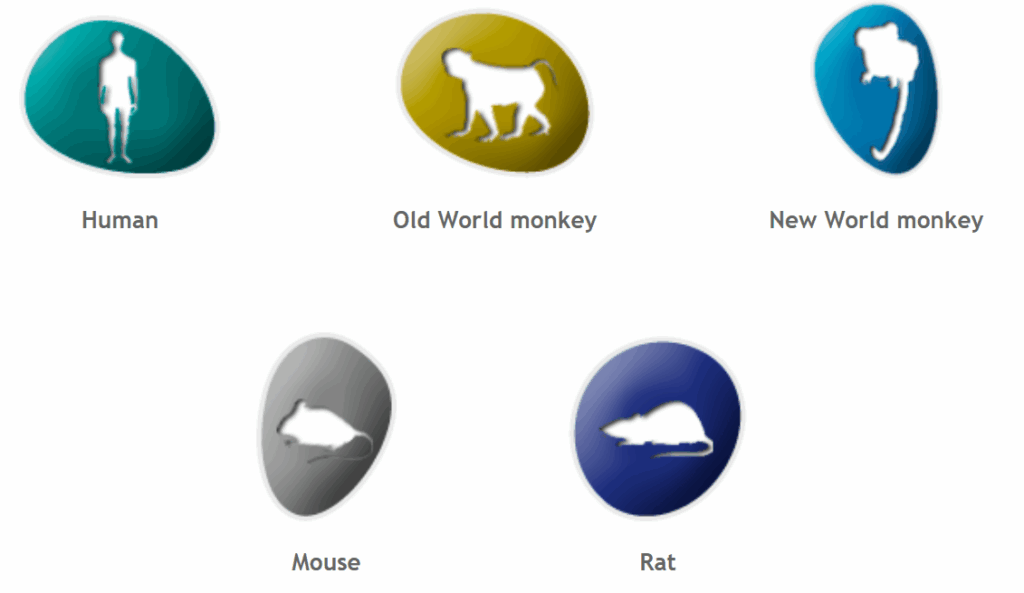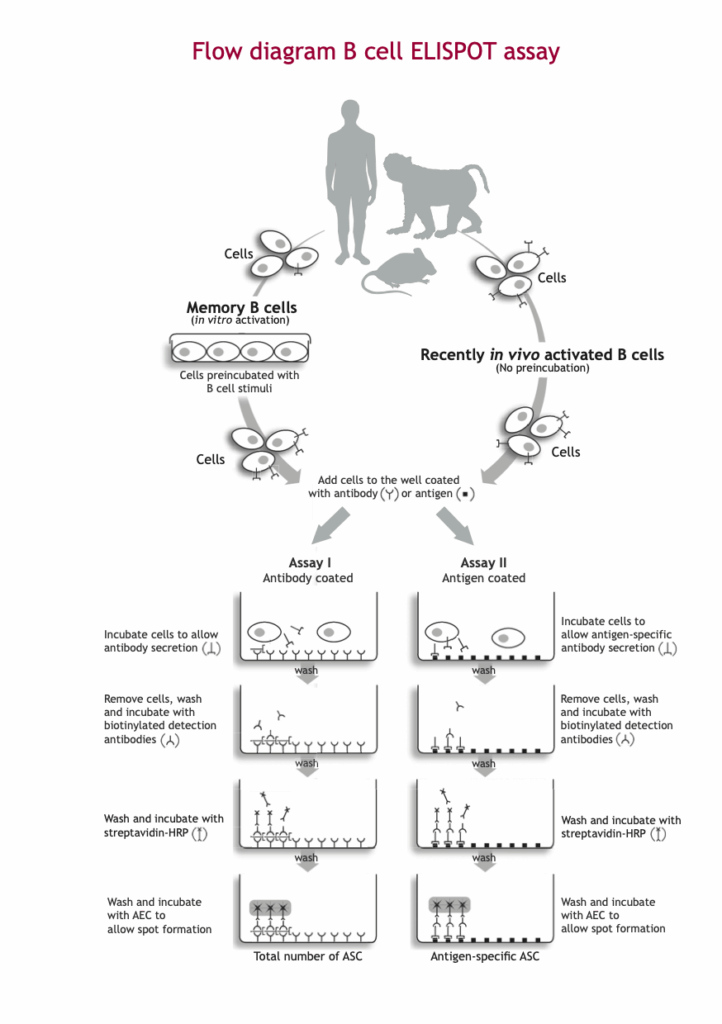Dutch ELISPOT and ELISA assays
With 25 years of experience and a dedicated team, U-CyTech specializes in cytokine ELISA, B cell and T cell ELISPOT assays, FluoroSpot kits and monoclonal antibodies.
Discover how ELISPOT and FluoroSpot assays from U-CyTech biosciences take you beyond traditional ELISA to highly sensitive, single‑cell immune monitoring.
The enzyme-linked immunospot (ELISPOT) assay, first described in 1983, is a powerful evolution of the classic ELISA immunoassay. While ELISA measures bulk cytokine or antibody levels in a sample, ELISPOT detects and quantifies individual cytokine‑secreting T cells or antibody‑secreting B cells at the single‑cell level.
Because plate‑bound antibodies capture proteins immediately as they are secreted, ELISPOT offers a sensitivity that surpasses conventional ELISA and intracellular cytokine staining. Rare antigen‑specific cells can be detected even at frequencies as low as 1 in 100,000 cells, making ELISPOT a preferred read‑out in many immunology workflows.
Today, ELISPOT assays are widely used in:
For researchers already using ELISA assays, ELISPOT is a natural next step when more granular, single-cell information is needed.

In 2025, U-CyTech transitioned from the traditional red ELISPOT staining to a blue staining ELISPOT system in our portfolio of U-CyTech biosciences kits. This is more than just a cosmetic change.
The new blue ELISPOT staining offers:
For laboratories dependent on robust, reproducible ELISPOT read‑outs, this upgrade combines improved safety with streamlined processing, while maintaining the high quality and specificity associated with U-CyTech ELISPOT assays.
The T cell ELISPOT assay is a highly sensitive method for detecting individual T cells that secrete specific cytokines or cytotoxic effector molecules. By capturing secreted proteins directly around each cell, the assay allows precise quantification of antigen‑specific T cell responses.
U-CyTech biosciences offers T cell ELISPOT kits for:

These kits cover a broad panel of cytokines and effector molecules relevant to cellular immunity, including:
The 2‑ and 5‑plate kit formats include all necessary reagents for blue spot detection, simplifying implementation in both routine and high‑throughput settings.
Monkey ELISPOT kits are validated for both Old World and New World species, including rhesus macaques, pig‑tailed macaques, cynomolgus monkeys, baboons and marmosets, making them suitable for preclinical and translational studies.
Compared with mixed lymphocyte reactions (MLR), cytotoxic T lymphocyte (CTL) assays or RT‑PCR:
This makes the T cell ELISPOT assay an excellent choice for:

While ELISA remains a standard method to quantify serum antibody levels, it does not reveal how many antigen‑specific memory B cells or plasma cells underlie the response. Long‑lived memory B cells and plasma cells are responsible for durable humoral immunity after vaccination or infection.
The B cell ELISPOT assay fills this gap by directly quantifying single antibody‑secreting cells (ASCs) and activated memory B cells.
U-CyTech biosciences provides B cell ELISPOT kits for:

These kits are designed to detect ASCs in blood or tissue samples such as peripheral blood, lymph nodes and spleen.
Because memory B cells are typically quiescent and do not secrete antibodies under resting conditions, their presence cannot be measured by ELISA alone. In contrast, the B cell ELISPOT assay:
B cell ELISPOT is particularly useful in:
The B cell ELISPOT assay is performed on plates coated either with:
After incubation of activated B cells in the coated wells, secreted antibodies are captured. Cells are washed away, and spots are developed using biotinylated anti‑immunoglobulin detection antibodies and enzyme‑labeled streptavidin, followed by substrate addition.
The resulting colored spots correspond to individual antibody‑secreting cells. By running Assay I and Assay II in parallel and comparing total ASCs to antigen‑specific ASCs, researchers obtain an accurate estimate of the frequency of antigen‑specific memory B cells.

For researchers who need to dissect complex T cell functional profiles, the FluoroSpot assay offers an advanced alternative to conventional ELISPOT. This dual‑color assay enables simultaneous detection of two cytokines secreted by the same cell using fluorophore‑labeled antibodies.
In immunology studies, FluoroSpot is particularly attractive for:
U-CyTech biosciences offers a broad panel of human and monkey FluoroSpot kits, including dual detection of IFN‑γ with a secondary cytokine such as:
Monkey FluoroSpot kits are designed to cross‑react with multiple macaque and baboon species. Each kit includes:
In the FluoroSpot read‑out, green and red fluorescent spots indicate cells producing individual cytokines, whereas yellow spots identify cells producing both cytokines simultaneously.
For laboratories already working with ELISA or considering upgrading to single‑cell immune assays, U-CyTech ELISPOT and FluoroSpot kits offer a reliable and user‑friendly solution:
Whether you are working in vaccine development, oncology, infectious disease, autoimmunity or transplantation research, ELISPOT and FluoroSpot assays provide the level of resolution required to understand functional immune responses.
We gladly support you by keeping you updated on our latest products and the developments around our services.